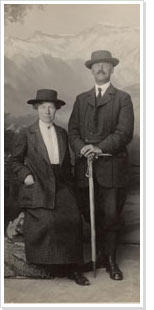Top items from the Literary Museum > Herman Gorter (1864-1927)
 Herman Gorter was the most important poet of his generation and belonged to the so called Eighties Movement. His epic poem Mei, first published in 1889, is commonly seen as one of the most beautiful creations of the Eighties Movement. The poem brought about a renewal in Dutch poetry. Later on, Gorter was to turn away from the individualistic Eighties Movement and embrace first socialism and then communism.
Herman Gorter was the most important poet of his generation and belonged to the so called Eighties Movement. His epic poem Mei, first published in 1889, is commonly seen as one of the most beautiful creations of the Eighties Movement. The poem brought about a renewal in Dutch poetry. Later on, Gorter was to turn away from the individualistic Eighties Movement and embrace first socialism and then communism.
Thanks to his endeavours to combine lyricism and social involvement, he remained a significant poet. He wrote essays on politics in the socialist monthly De Nieuwe Tijd, where he had been the editor since 1898, together with Henriëtte Roland Holst and others. Whereas Gorter is best known in the Netherlands for his poetry, in other countries he owes his fame chiefly to his activities as a revolutionary and a propagandist of Marxism.
The Gorter collection covers the period from 1827 until his death in 1927. The basis of the collection is formed by the documents he left behind and his friend Jenne Clinge Doorenbos gathered immediately after his death. In the course of time, the collection has been supplemented with documents from other legacies and archives. It includes letters to and from Gorter, handwritten documents, typescripts, printer’s proofs, official and personal papers (among which financial records and contracts), twelve works Gorter had printed privately and that differ in some places from the mainstream editions, and a copy of Albert Verwey’s platform brochure Toen de Gids werd opgericht... (1897).
The manuscript of the poem Mei (published in 1889) has been selected for this site (click 'inhoudsopgave' to browse through the document).
<< back to the list | next author >>
